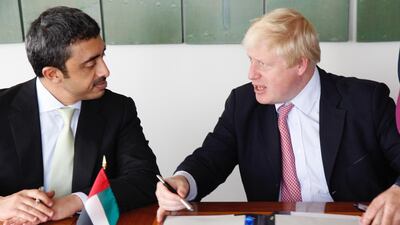Greater cooperation with Gulf countries to counter violent extremism and tackle radicalisation of Muslims would improve British security one year on from a spate of mass casualty terrorist attacks, the Henry Jackson Society think tank says in a new report.
"Western countries such as the US and the UK are the Gulf countries' main allies and providers of training, intelligence, personnel and other resources to combat extremism," the report said. "The UK should seek to deepen its engagement with Gulf nations beyond intelligence cooperation."
Najah Al Otaibi, Henry Jackson Society researcher and author of the report, told The National that British involvement in centres that specialise in anti-extremist work and deradicalisation would also create a more effective local response to a problem that meant an estimated 5,500 residents joined terrorist outfits from the region in 2015 alone.
"There are lots of initiatives in the Gulf and UK expertise would be welcomed," she told The National. "The power of online radicalisation is such that it is not something only one country can fight but all countries can contribute together.
Welcoming the appointment of a new Commission for Counter-Extremism in Britain, Ms Al Otaibi said that its chairwoman, Sara Khan, was well placed to step up co-operation and to use the body as a platform to create international linkages.
"She is an excellent choice, someone who has a real understanding of the cultural and historic roots of radicalisation and how international cooperation can tackle the problem," Ms Al Otaibi said.
In particular the report highlights the work of two organisations in the UAE, Hedayah and the Sawab Centre, as well as several in Saudi Arabia that have strong potential to bolster efforts to counter violent extremism worldwide.
Hedayah has been a pioneer in the field since 2012, while Sawab has pursued a very effective online campaign against ISIL since 2015. The #Inherstory hashtag was cited as an model of a very successful social media intervention against the online reputation of the group.
Backing the modernisation programme of Saudi Arabia's Crown Prince Mohammed bin Salman is a key theme of the report. The country placed great emphasis on rehabilitation centres and international faith-based dialogue is now moving on to a new focus in its approach.
The signature reform programme Vision 2030 has stressed the need to include religious affairs within its overall ambitions. The Crown Prince himself has said Saudi Arabia will not "spend 30 years" destroying extremist ideologies but do so immediately.
It already operates the Al Sakinah Campaign which effectively targets extremist websites and other online activity. The Etidal global centre, launched by King Salman and US President Donald Trump in May, provides an opportunity for British influence to be brought to bear on an emerging institution.
"The UK has no influence when it comes to these institutions fighting extremism overseas but it could engage more with soft power tools by offering joint collaboration," Ms Al Otaibi added.
The report, Terror Overseas: Understanding the GCC Counter Extremism and Counter Extremism Trends, makes four core recommendations:
The UK must provide backing for modernisation projects taking place in the Gulf, such as the Saudi Arabian Vision 2030, encouraging the development of a moderate Islamic narrative which integrates liberal values – challenging the ideological origins of extremism in the region.
The West should consider funding civil society initiatives in Gulf states, going beyond surface-level intelligence sharing and tackling the fundamental problems which cause extremism and terrorism at their roots.
The UK should consider the creation of international centres of excellence to counter extremism. These would enhance anti-terrorism programmes and mean that the UK was being proactive rather than reactive in tackling radicalisation.
Technology companies must address the use of their platforms to spread extremist messages and engage on this with the Gulf States, establishing a joint effort to counter the increasingly sophisticated and pervasive reach of extremist recruitment.


